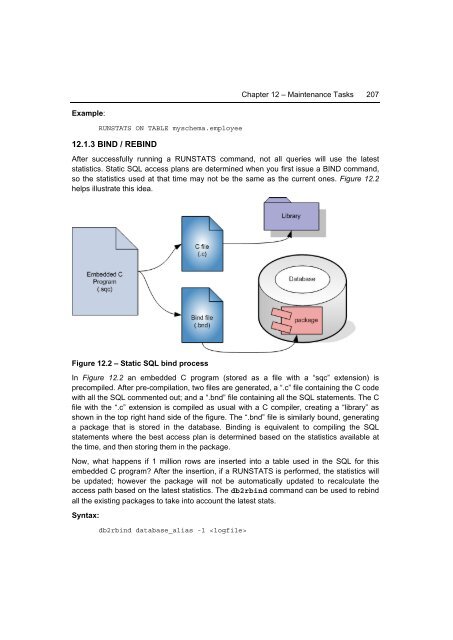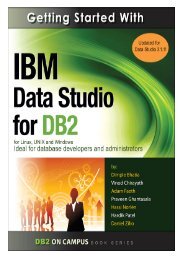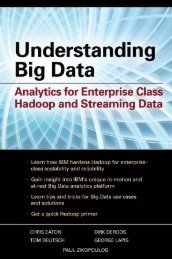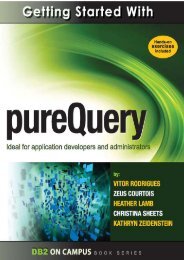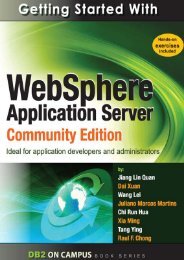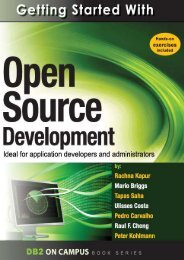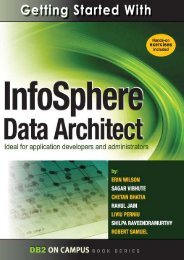- Page 3 and 4:
GETTING STARTED WITH DB2 Express-C
- Page 5 and 6:
Contents About this book ..........
- Page 7 and 8:
Contents 7 6.3 DB2 storage model ..
- Page 9 and 10:
Contents 9 13.4.2 Cursor stability
- Page 11 and 12:
About this book Notices and tradema
- Page 13 and 14:
About this Book 13 A book for the c
- Page 15:
About this Book 15 Foreword Innovat
- Page 19 and 20:
1 Chapter 1 - What is DB2 Express-C
- Page 21 and 22:
Chapter 1 - What is DB2 Express-C?
- Page 23 and 24:
Chapter 1 - What is DB2 Express-C?
- Page 25 and 26:
1.8 Moving up to another DB2 editio
- Page 27:
Chapter 1 - What is DB2 Express-C?
- Page 30 and 31:
30 Getting Started with DB2 Express
- Page 32 and 33:
32 Getting Started with DB2 Express
- Page 34 and 35:
34 Getting Started with DB2 Express
- Page 36 and 37:
36 Getting Started with DB2 Express
- Page 38 and 39:
38 Getting Started with DB2 Express
- Page 40 and 41:
40 Getting Started with DB2 Express
- Page 42 and 43:
42 Getting Started with DB2 Express
- Page 44 and 45:
44 Getting Started with DB2 Express
- Page 46 and 47:
46 Getting Started with DB2 Express
- Page 48 and 49:
48 Getting Started with DB2 Express
- Page 50 and 51:
50 Getting Started with DB2 Express
- Page 52 and 53:
52 Getting Started with DB2 Express
- Page 54 and 55:
54 Getting Started with DB2 Express
- Page 56 and 57:
56 Getting Started with DB2 Express
- Page 59 and 60:
4 Chapter 4 - DB2 Environment The D
- Page 61 and 62:
Chapter 4 - DB2 Environment 61 Figu
- Page 63 and 64:
Chapter 4 - DB2 Environment 63 Figu
- Page 65 and 66:
Chapter 4 - DB2 Environment 65 Figu
- Page 67 and 68:
Chapter 4 - DB2 Environment 67 Figu
- Page 69 and 70:
Chapter 4 - DB2 Environment 69 conf
- Page 71 and 72:
Chapter 4 - DB2 Environment 71 Figu
- Page 73 and 74:
Chapter 4 - DB2 Environment 73 Tabl
- Page 75 and 76:
Chapter 4 - DB2 Environment 75 4.3
- Page 77 and 78:
Chapter 4 - DB2 Environment 77 6. S
- Page 79:
Chapter 4 - DB2 Environment 79 20.
- Page 82 and 83:
82 Getting Started with DB2 Express
- Page 84 and 85:
84 Getting Started with DB2 Express
- Page 86 and 87:
86 Getting Started with DB2 Express
- Page 88 and 89:
88 Getting Started with DB2 Express
- Page 90 and 91:
90 Getting Started with DB2 Express
- Page 92 and 93:
92 Getting Started with DB2 Express
- Page 94 and 95:
94 Getting Started with DB2 Express
- Page 96 and 97:
96 Getting Started with DB2 Express
- Page 98 and 99:
98 Getting Started with DB2 Express
- Page 100 and 101:
100 Getting Started with DB2 Expres
- Page 102 and 103:
102 Getting Started with DB2 Expres
- Page 104 and 105:
104 Getting Started with DB2 Expres
- Page 106 and 107:
106 Getting Started with DB2 Expres
- Page 109 and 110:
6 Chapter 6 - DB2 Architecture In t
- Page 111 and 112:
Chapter 6 - DB2 Architecture 111 pr
- Page 113 and 114:
Chapter 6 - DB2 Architecture 113 6.
- Page 115 and 116:
Chapter 6 - DB2 Architecture 115 Fi
- Page 117 and 118:
Chapter 6 - DB2 Architecture 117 Ma
- Page 119 and 120:
6.3.3.4 Creating a Table Space usin
- Page 121 and 122:
Chapter 6 - DB2 Architecture 121 3.
- Page 123:
Chapter 6 - DB2 Architecture 123 7.
- Page 126 and 127:
126 Getting Started with DB2 Expres
- Page 128 and 129:
128 Getting Started with DB2 Expres
- Page 130 and 131:
130 Getting Started with DB2 Expres
- Page 132 and 133:
132 Getting Started with DB2 Expres
- Page 134 and 135:
134 Getting Started with DB2 Expres
- Page 136 and 137:
136 Getting Started with DB2 Expres
- Page 138 and 139:
138 Getting Started with DB2 Expres
- Page 141 and 142:
8 Chapter 8 - Working with Database
- Page 143 and 144:
Chapter 8 - Working with Database O
- Page 145 and 146:
Chapter 8 - Working with Database O
- Page 147 and 148:
Chapter 8 - Working with Database O
- Page 149 and 150:
Chapter 8 - Working with Database O
- Page 151 and 152:
Chapter 8 - Working with Database O
- Page 153 and 154:
Chapter 8 - Working with Database O
- Page 155 and 156: Chapter 8 - Working with Database O
- Page 157 and 158: Chapter 8 - Working with Database O
- Page 159 and 160: Chapter 8 - Working with Database O
- Page 161 and 162: 9 Chapter 9 - Data Movement Utiliti
- Page 163 and 164: Chapter 9 - Data Movement Utilities
- Page 165 and 166: Chapter 9 - Data Movement Utilities
- Page 167 and 168: Chapter 9 - Data Movement Utilities
- Page 169 and 170: Chapter 9 - Data Movement Utilities
- Page 171: Chapter 9 - Data Movement Utilities
- Page 174 and 175: 174 Getting Started with DB2 Expres
- Page 176 and 177: 176 Getting Started with DB2 Expres
- Page 178 and 179: 178 Getting Started with DB2 Expres
- Page 180 and 181: 180 Getting Started with DB2 Expres
- Page 182 and 183: 182 Getting Started with DB2 Expres
- Page 184 and 185: 184 Getting Started with DB2 Expres
- Page 186 and 187: 186 Getting Started with DB2 Expres
- Page 188 and 189: 188 Getting Started with DB2 Expres
- Page 191 and 192: 11 Chapter 11 - Backup and Recovery
- Page 193 and 194: Chapter 11 - Backup and Recovery 19
- Page 195 and 196: 11.4 Database logging from the Cont
- Page 197 and 198: Chapter 11 - Backup and Recovery 19
- Page 199 and 200: Chapter 11 - Backup and Recovery 19
- Page 201 and 202: Chapter 11 - Backup and Recovery 20
- Page 203: Chapter 11 - Backup and Recovery 20
- Page 208 and 209: 208 Getting Started with DB2 Expres
- Page 210 and 211: 210 Getting Started with DB2 Expres
- Page 212 and 213: 212 Getting Started with DB2 Expres
- Page 215 and 216: 13 Chapter 13 - Concurrency and Loc
- Page 217 and 218: Chapter 13 - Concurrency and Lockin
- Page 219 and 220: Chapter 13 - Concurrency and Lockin
- Page 221 and 222: Chapter 13 - Concurrency and Lockin
- Page 223 and 224: Chapter 13 - Concurrency and Lockin
- Page 225 and 226: Chapter 13 - Concurrency and Lockin
- Page 227 and 228: Chapter 13 - Concurrency and Lockin
- Page 229 and 230: Chapter 13 - Concurrency and Lockin
- Page 231 and 232: 13.10 Summary In this chapter we lo
- Page 233 and 234: Chapter 13 - Concurrency and Lockin
- Page 235 and 236: Chapter 13 - Concurrency and Lockin
- Page 237: PART III - LEARNING DB2: APPLICATIO
- Page 240 and 241: 240 Getting Started with DB2 Expres
- Page 242 and 243: 242 Getting Started with DB2 Expres
- Page 244 and 245: 244 Getting Started with DB2 Expres
- Page 246 and 247: 246 Getting Started with DB2 Expres
- Page 248 and 249: 248 Getting Started with DB2 Expres
- Page 250 and 251: 250 Getting Started with DB2 Expres
- Page 252 and 253: 252 Getting Started with DB2 Expres
- Page 254 and 255: 254 Getting Started with DB2 Expres
- Page 256 and 257:
256 Getting Started with DB2 Expres
- Page 258 and 259:
258 Getting Started with DB2 Expres
- Page 260 and 261:
260 Getting Started with DB2 Expres
- Page 262 and 263:
262 Getting Started with DB2 Expres
- Page 264 and 265:
264 Getting Started with DB2 Expres
- Page 266 and 267:
266 Getting Started with DB2 Expres
- Page 268 and 269:
268 Getting Started with DB2 Expres
- Page 270 and 271:
270 Getting Started with DB2 Expres
- Page 272 and 273:
272 Getting Started with DB2 Expres
- Page 274 and 275:
274 Getting Started with DB2 Expres
- Page 276 and 277:
276 Getting Started with DB2 Expres
- Page 278 and 279:
278 Getting Started with DB2 Expres
- Page 280 and 281:
280 Getting Started with DB2 Expres
- Page 282 and 283:
282 Getting Started with DB2 Expres
- Page 284 and 285:
284 Getting Started with DB2 Expres
- Page 286 and 287:
286 Getting Started with DB2 Expres
- Page 288 and 289:
288 Getting Started with DB2 Expres
- Page 290 and 291:
290 Getting Started with DB2 Expres
- Page 292 and 293:
292 Getting Started with DB2 Expres
- Page 294 and 295:
294 Getting Started with DB2 Expres
- Page 296 and 297:
296 Getting Started with DB2 Expres
- Page 298 and 299:
298 Getting Started with DB2 Expres
- Page 300:
Getting started with DB2 9.7 couldn


